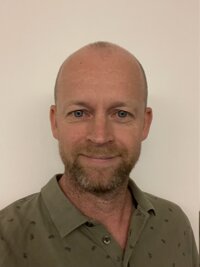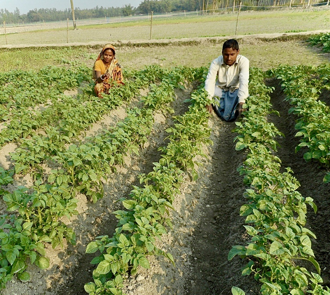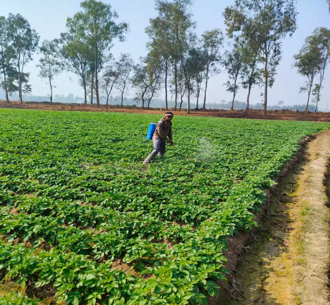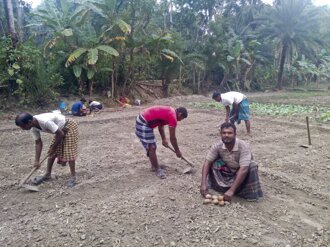‘The Key to Success: Farms Provide Free Agro-Advice Using Satellite Data’

© Eric van Valkengoed
Introduction
For ten years, the Netherlands invested in the Geodata for Agriculture and Water (G4AW) programme. In this series, key players reflect on the past and look towards the future. Eric van Valkengoed of TerraSphere developed a successful service to combat crop diseases, in collaboration with Wageningen University, a large agro-business, and a local partner in Bangladesh.
You have worked in developing countries for a long time and with satellite data. How did you get started on this path?
‘It actually began in my youth. I read a lot of science fiction. Anything related to space, including satellites, fascinated me. Later, I discovered how I could combine space science with my studies in forestry and ecology. Using satellite data, you can help solve farmers' challenges on the other side of the world. It sounds like science fiction, but that’s what we do.’
Who are 'we'?
‘In 2008, I co-founded TerraSphere with Paul van der Voet. We now have a team of eight, all specialists in satellite services and ICT. For us, G4AW was a fantastic opportunity to establish a presence in Asia. We now have an office in Indonesia with three employees.’
What role did TerraSphere play in the G4AW programme?
‘We provided satellite data on crops for three projects. From space, you can see what type of crop is being grown, how healthy it is, and how well it is growing compared to previous years. Using this data as a foundation, we developed unique services. For instance, to prevent plant diseases or to insure small food producers against crop failures.’

© Geopotato
Which G4AW project was the most successful?
‘That would be GEOPOTATO. We helped farmers in Bangladesh tackle Phytophthora, a fungal disease that is a major problem for potato producers worldwide. For small farmers, crop protection is relatively expensive, and timely application of treatments is complicated due to unpredictable weather. Using satellite data and disease models developed by Wageningen University, we can calculate when the risk of an outbreak is highest. This information was sent via text messages and voice messages in Hindi to over fifty thousand farmers: spray this type of treatment within 36 to 72 hours at this concentration on your field.’
How does a small service provider from the Netherlands reach so many small farmers in Bangladesh?
‘We work in partnership with Bayer, a large agro-business that sells agricultural products in Bangladesh and wanted to expand its services to farmers. Bayer has agricultural advisors in the field—marketers who travel around on scooters to supply farmers with products. They saw our service as an excellent marketing tool: with advice based on satellite data, they could offer something their competitors didn’t have.’
How do you ensure that as a small company, you don't become dependent on such a large agro-business?
‘There is always that risk. One way to manage it is not to promise exclusivity. As a small player, you need to be able to offer your services to everyone. At the same time, you shouldn’t overestimate the risk. The remote sensing sector is not overflowing with commercial clients. We also diversify ourselves. Soon, we will start pilots with an insurance company and a microcredit provider in Indonesia, using our experiences from other G4AW projects.’

© Bayer
And what does the collaboration bring to a large agro-business like Bayer?
‘Bayer is very pleased with the ongoing partnership. Globally, there is a focus on reducing the use of fertilisers, pesticides, and herbicides. They are capitalising on this. If Bayer can offer less product per farmer but maintain quality and reach many more customers thanks to high-tech solutions, it ultimately leads to profit. And not just for Bayer, but also for small farmers and our planet.’
Were the other G4AW projects you were involved in equally successful?
‘In G4INDO in Indonesia, we made a mistake by exclusively partnering with a government agency. Governments find it difficult to contract commercial parties from abroad, making us completely dependent and unable to gain a foothold. Another project in Myanmar was halted due to a military coup. Our local partner there, Village Link, continues the service in a limited form. For us, GEOPOTATO was the success story. It is now an operational service in Bangladesh.’
Has your contribution to G4AW led to new opportunities for the future?
© Geopotato
‘A direct result is our participation in a new ESA project in Indonesia, India, and Bangladesh, focusing on disease prevention in various crops. Bayer is again involved, this time focusing on tomatoes in India. With what we learned from G4AW, we were able to set up this new project and service more maturely from the start. Besides agro-input, the project includes crop insurance and microcredits for small farmers. By involving and benefiting these more capital-intensive sectors, we can provide small farmers with good and “free” advice and financial products.’
Is bundling services the key to success?
‘Among other things. G4AW has made several things clear. Use proven solutions for new crops in new areas. Collaborate with the right local partners, give them the lead, and ensure they benefit as well. Link services that strengthen each other, such as advice, insurance, access to financial institutions, and credit. Don’t burden small farmers with subscriptions or costs. Make it easy to understand, practical to apply, and, most importantly, free for them. That’s when the chance of success is greatest.’